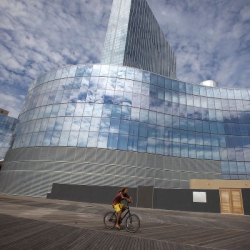
Brookfield Wanted to Cut Its $3 Million per Month Energy Costs, But Negotiations Were Fruitless
In a surprise announcement on Thursday, Brookfield Property Partners LP said it would pull out of its plans to buy the Revel Casino for $110 million. Brookfield planned to reopen the Revel Casino as a gaming operation, but it decided not to get into Atlantic City market because it could not win a reduction in the cost of electricity for the new operation. The current contract stipulated a $3 million payment for electricity each month. Brookfield Property Partners announced their decision in an email on November 19.
The Revel Casino had a contract in place to buy power and utility services for $3 million a month from ACR Energy Partners LLC. If Brookfield were to buy Revel Casino, it would need to honor that contract or ask the ACR Energy to restructure the contract. ACR Energy Partners is a joint venture between DCO Energy LLC and South Jersey Industries Inc. (SJI). A South Jersey Industries spokesman, Don Lockwood, told Bloomberg that ACR Energy Partners had no involvement in talks between Brookfield and the bondholders of the joint venture. Apparently, those talks went nowhere, so Brookfield decided its business venture in the Revel Casino would be impossible at those prices.
Don Guardian Is Disappointed
Mayor Don Guardian said he was disappointed when he spoke with Bloomberg Online about Brookfield’s decision. Mayor Guardian said, “I am sorry to hear that the Brookfield transaction was not completed. Although Brookfield would have been a good fit for Atlantic City, we will continue to attract new investors.”
Brookfield Property Partners (BPY) is a Toronto-based firm which owns the Atlantis resort in the Bahamas, as well as the Hard Rock Hotel & Casino in Las Vegas. Last month, Brookfield won an auction in bankruptcy court for the Revel Casino. Brookfield bid $110 million, while Florida real estate developer Glenn Straub bid $94.5 million in the same auction. Straub, who was the stalking horse candidate (and thus pocketed $3 million in cash for the lost auction), has since appealed the decision.
Glenn Straub Might Win by Default
Glenn Straub and his lawyer claimed irregularities in the auction process. Both Glenn Straub and Stuart Moskovitz, the attorney for Straub, claimed that the owners of Revel Casino and the representatives of Brookfield were able to discuss in private their financial situation, which was in violation of the agreed-upon rules for transparency and honesty. It is uncertain whether Straub will maintain his $94.5 million bid or not. Straub wanted to use Revel Casino as a railway link, while building a university campus on adjacent land near Revel.
When Stuart Moskovitz was contacted by reporters, he could not say whether Glenn Straub would drop his appeal and seek to buy the Revel Casino again. The price for the casino property is less than 5% of its original value, as the land and structure cost the original builders $2.4 billion to develop.
Revel Casino’s Previous Troubles
That put too large of a debt burden on the Revel Casino’s operators, so the casino was never profitable, despite being the newest and grandest of Atlantic City’s casinos. From April 2012 to September 2014, the casino was in operation, but it went through two bankruptcies in those 29 months of operation.
Revel Casino is not the only gambling operation in Atlantic City to have struggled in the past several years. At the beginning of 2014, twelve casinos were in operation in Atlantic City. By the end of the year, only 7 casinos will still have their doors open. The gaming industry has been in total free-fall, as revenues dropped almost in half over the past 7 years. It is thought the 2014 fiscal year reports will reveal the most disappointing numbers in the past 10 years.
Carl Icahn and Trump Taj Mahal
Brookfield’s disappointment in trying to get a price reduction is not the first time in the near-past that a casino operator has been unable to get officials to budge. Carl Icahn asked for Atlantic City to offer significant tax breaks if Icahn would agree to put $100 million into the struggling Trump Taj Mahal. Mayor Don Guardian said his city would not offer such a bailout to Carl Icahn. He claimed it was not economically feasible to do so.
After that failed, Icahn called for union workers at the Taj to sacrifice their health benefits and pension to keep the casino in operation. That touched off a firestorm of controversy, as Union Here 54 protested in the streets of Atlantic City and caused a traffic gridlock. Icahn, meanwhile, got a judge to strip away the union member’s health and pension benefits, at least temporarily.
